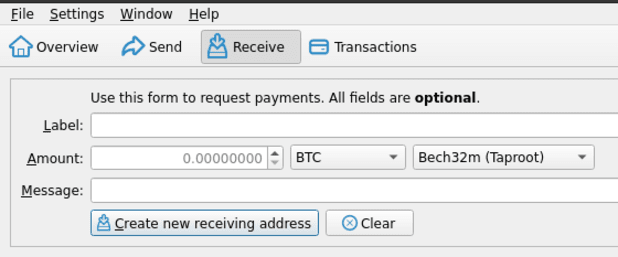A brand unique model of the brand new Bitcoin utility client launched by Satoshi Nakamoto has been released currently.
Bitcoin Core 23.0 changed into labored on by 132 developers over about seven months to bring tangible enhancements to Bitcoin Core’s pockets, locate-to-locate dialog and community, fee estimation, and lots extra.
This article explores about a of the predominant adjustments.
Pockets Updates
Taproot Increase
Bitcoin Core now enables the user to buy the unique Taproot address form when constructing a brand unique pockets. Even supposing that isn’t the default, as many wallets in the ecosystem can’t send to a Taproot address yet, the user is given the likelihood to electrify Taproot receiving addresses in newly-created wallets.
The Taproot address created by the Bitcoin Core pockets for receiving bitcoin is a straight forward, single signature one. Therefore, customers obtained’t automatically set BTC in costs compared to fashioned Bech32 single-signature addresses, as bigger financial savings come from porting extra advanced spending stipulations and address setups into the Taproot blueprint.
By alongside with native lend a hand for Taproot addresses, Bitcoin Core takes a step in opposition to encouraging a a lot wider adoption of Taproot. As extra customers decide into the unique purple meat up’s parts, its advantages are in a advise to simplest permeate thru the userbase.
Descriptor Wallets Are Now The Default
Bitcoin Core wallets now default to the consume of descriptors when created, a well-known change that promises a bigger backup and restoration route of for bitcoin funds.
For the reason that introduction of hierarchical deterministic (HD) wallets, a Bitcoin pockets will assuredly consume the restoration seeds (usually 12 or 24 phrases) to generate a grasp deepest key. The pockets then makes consume of that grasp deepest key to generate a grasp public key, which is able to be leveraged to generate a almost infinite different of receiving addresses thru derivation paths, that because the title says, recordsdata the pockets to what route it ought to restful observe to accurately gain an address.
Getting better funds in a Bitcoin pockets therefore frequently is dependent upon that derivation route, as most applications currently default to HD wallets. (The usage of quite lots of derivation paths by wallets is the reason why it’s general to gape a user making an strive to recuperate funds in a 2nd pockets finding a steadiness of zero.)
However, descriptor wallets make it some distance more straightforward for the user to recuperate any funds by explicitly stating the derivation route in the descriptor. The user is thereby relieved from having to care referring to the derivation route their pockets prone – an infinite enchancment in user expertise (UX).
Typos On Bech32 Addresses Can Now Be Spotted
Bech32 addresses, the layout in which the address begins with “bc1,” occupy a sexy property that enables the spotting of that you just would factor in typos. However, it wasn’t unless Bitcoin Core 23.0 that the user would possibly maybe well additionally profit from that.
Bitcoin Core will now alert the user about as a lot as two errors in a Bech32 address. The tool is currently finest available in the market on the impart line, thru the “validateaddress” RPC, though there are plans to mix it into the graphical user interface (GUI) in some unspecified time in the future. If better than two errors are made by the user when typing out the address, then the typo-finding tool can no longer guarantee success.
The limit of errors the tool commits to finding is compulsory because making an strive for a unparalleled different of typos would possibly maybe well additionally end result in undesired behavior. If the user typed an address with lots of unsuitable letters, although the tool would possibly maybe well additionally space all of them it will most likely well additionally cease up suggesting a completely different address than what the user supposed to send to in the most predominant advise – a a lot worse extinguish end result.
Freezing Coins
A Bitcoin Core user has had the likelihood to buy what money, or unspent transaction outputs (UTXOs), to consume in a transaction for years now. However this coin withhold a watch on feature required book different of what UTXOs to consume at any time when – a cumbersome and slow route of that is highly inclined to error.
Now, Bitcoin Core enables the user to indefinitely “freeze” a UTXO. The freezing route of is restful a book one, but the user finest desires to realize that when and would possibly maybe well then relaxation assured that the coin they iced up obtained’t be automatically spent by Bitcoin Core unless the user unfreezes that coin.
Fastidiously selecting which UTXOs to consume in funding a transaction is compulsory to forestall undesirably linking addresses which occupy conflicting applications. As an instance, a user would possibly maybe well additionally no longer are looking to be a half of UTXOs they obtained thru know-your-buyer (KYC) methods with non-KYC money. If they did, any observer of the blockchain would be in a advise to infer that that user, whom they would possibly maybe additionally know due to the KYC data equipped, also owns the non-KYC address and its money – hurting user privacy.
Modifications To P2P Communications
Port 8333 Desire Eradicated
Broadly speaking, computers need two predominant pieces of data to communicate with each and every different on the net: an IP address and a port number. Whereas the IP address serves as an identifier for a laptop in a community, helping resolve its region, the port number helps teach what form of dialog is being carried out on the net as each and every dialog protocol usually defaults to a advise port number. In consequence, ports enable a laptop to hunch extra than one kinds of traffic on the identical time whereas with out problems differentiating between them. As an instance, the net’s HTTP protocol defaults to port 80, whereas its extra salvage counterpart HTTPS usually runs on port 443, and email’s SMTP protocol leverages port 25.
With Bitcoin, it’s no different. Historically, upon beginning Bitcoin Core, computers default to running on port 8333 and shopping for peers the consume of that identical port.
Whereas ports facilitate the dialog between computers on the net, it also makes it more straightforward for net service suppliers (ISPs) to computer screen traffic as it’s easy to safe what form of dialog is being carried out. In an adversarial setup, an ISP would possibly maybe well additionally filter and block particular traffic primarily based on the shuttle space port. Regardless of no longer being the supreme censorship mechanism available in the market to ISPs, it’s miles the finest, and an attacked protocol would need to interchange its default port of dialog to circumvent the censoring or throttling.
By inserting off the port 8333 preference, Bitcoin Core now mitigates the finest route ISPs occupy for filtering or blocking off Bitcoin traffic. Additionally, nodes no longer running on port 8333 now would possibly maybe well occupy less friction getting inbound connections from different nodes because the community no longer prioritizes that port.
Increase For The CJDNS Community
Bitcoin Core 23.0 also protects customers from adversarial ISPs by alongside with lend a hand for CJDNS, a security-enhanced different to the fashioned net protocol (IP).
CJDNS leverages public-key cryptography to implement an encrypted model of IPv6 – the most unique model of IP. By providing cease-to-cease encryption natively, CJDNS improves upon IPv6 and IPv4 (the old IP model that is restful broadly prone) with increased security and privacy as it protects nodes that consume it from traffic evaluation and filtering.
The addition brings unique optionality for customers drawn to preserving their traffic from prying eyes or increasing the security of their Bitcoin setup. Whereas Tor and I2P exist as picks to clearnet IP, CJDNS serves as a complementary possibility that would possibly maybe enhance robustness for the Bitcoin community and its nodes.
Greater Rate Estimations
Bitcoin Core’s built-in fee estimation tool has engaging gotten a little extra entire.
Based on a weblog post by John Newbery on the subject, Bitcoin Core’s fee estimation “merely records and reports well-known statistics about previous events, and makes consume of that recordsdata to present the user a cheap estimate of how a lot fee they wish to join in elaborate to occupy their transaction integrated inner N blocks,” with N being the different of blocks the user is willing to wait to occupy their transaction confirmed.
The algorithm calculating such estimates liable to take into story all transactions on the mempool, Bitcoin’s “ready advise” for transactions that haven’t yet been integrated in a block. However, since the introduction of replace-by-fee (RBF) transactions, which enable the user to effectively bump the fee their transaction is pledging to miners in an strive to salvage a faster confirmation, Bitcoin Core didn’t story for the unique transaction form when estimating costs out of doubts whether or no longer the feature would be broadly adopted by customers and miners.
Now, with Bitcoin Core 23.0, RBF transactions are taken into story on Bitcoin Core’s fee estimations, providing a extra engaging estimate for customers leveraging the utility for sending transactions.
Increase For Tracepoints And Userspace, Statically-Outlined Tracing
Bitcoin Core now includes experimental tracepoints in its birth binaries for Linux with userspace, statically-outlined tracing (USDT).
USDT enables customers to salvage detailed data from their node that would possibly maybe well additionally be prone for overview, debugging and monitoring. The feature makes it that you just would factor in to lift video display of customized engaging-grained statistics and computer screen in every other case hidden inner node events whereas having little to no performance impact when unused.
One instance where here’s critical is to space and plod forestall attacks. A security researcher would possibly maybe well additionally region up extra than one nodes and achieve the messages got from peers to presumably identify attacks before time.
Thanks to Aaron van Wirdum for data and suggestions.
For extra predominant aspects and different adjustments, gape the Bitcoin Core 23.0 birth notes. To download Bitcoin Core 23.0, navigate here. Vital aspects about Bitcoin Core 23.0 are also outlined in audio in the Bitcoin Outlined podcast episode 56.


